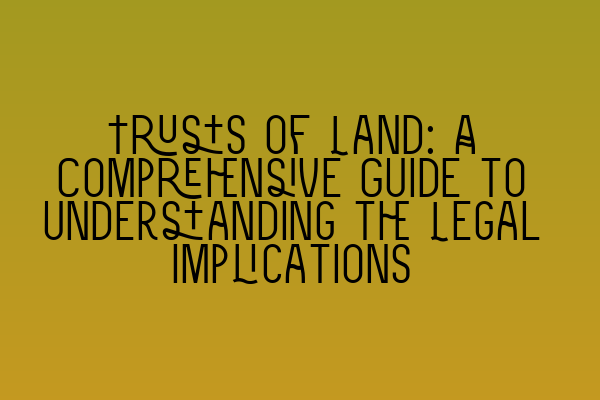Trusts of Land: A Comprehensive Guide to Understanding the Legal Implications
Welcome to SQE Property Law & Land Law! As experts in property law, we understand the complexities and nuances that come with dealing with trusts of land. In this comprehensive guide, we will explore the legal implications of trusts of land and provide you with a thorough understanding of this topic.
What are Trusts of Land?
Before we dive into the legal implications, let’s first understand what trusts of land are. A trust of land is a legal arrangement where one or more individuals are entrusted with holding and managing land or property on behalf of others, known as beneficiaries. This arrangement is governed by the law of trusts, which sets out the rights and responsibilities of the parties involved.
Legal Implications of Trusts of Land:
1. Co-ownership: Trusts of land commonly arise in situations where two or more individuals jointly own property. This can include spouses, business partners, or family members. It is vital to understand the legal implications of co-ownership, such as the different types of co-ownership (joint tenancy and tenancy in common) and the rights and obligations of co-owners. To learn more about contractual capacity, check out our article on Understanding Contractual Capacity: Rights and Limitations.
2. Beneficial Interests: Within a trust of land, each beneficiary holds a beneficial interest in the property. These interests can vary in nature, such as a right to occupy, a right to receive income, or a right to sell the property. It is crucial to determine the beneficiaries’ respective interests to ensure their rights are protected and their expectations are met.
3. Trustee Duties: As trustees of the land, individuals have legal obligations to act in the best interests of the beneficiaries. This includes managing the property, making decisions regarding its use and development, and maintaining proper accounting records. Understanding the trustee’s duties is essential to avoid breaching their fiduciary responsibilities.
4. Trustee Powers: Alongside their duties, trustees are granted certain powers to deal with the property. These powers can include the ability to sell, lease, or mortgage the land. However, it is crucial to note that trustees must exercise these powers in accordance with the terms of the trust, the law, and their fiduciary duties.
5. Disputes and Resolutions: Trusts of land can sometimes result in disputes among beneficiaries or between beneficiaries and trustees. These disputes can arise from disagreements over the management or use of the property, changes in circumstances, or alleged breaches of trust. Resolving these disputes can be complex, requiring legal expertise and knowledge of property law.
Now that we have explored the legal implications of trusts of land, it is essential to assess your understanding. Take our Interactive SQE Mock Tests for Contract Law: Test Your Knowledge to assess your knowledge and ensure you are well-prepared for any property law-related assessments.
At SQE Property Law & Land Law, we are committed to providing expert insights and guidance on property law topics. Join our SQE Contract Law Webinars where our experienced professionals share their expertise and answer your questions.
Understanding trusts of land is crucial not only for legal professionals, but also for individuals dealing with property matters. Whether you are a co-owner, a beneficiary, or a trustee, having a comprehensive understanding of the legal implications can help protect your rights and ensure a smooth process.
In conclusion, trusts of land are complex legal arrangements that require careful consideration. By understanding the legal implications, you can navigate the intricacies of co-ownership, ascertain beneficial interests, fulfill trustee duties, exercise trustee powers appropriately, and effectively resolve any disputes that may arise.
Stay up-to-date with the latest changes in property law by reading our article on Contract Law Reforms: An Analysis of Recent Changes. For a detailed understanding of the rights and responsibilities of parties in a contract, don’t miss our article on Parties in a Contract: Rights and Responsibilities.
If you require legal assistance or further guidance regarding trusts of land, please do not hesitate to contact us at SQE Property Law & Land Law. Our team of experts is ready to provide you with the professional assistance you need.
